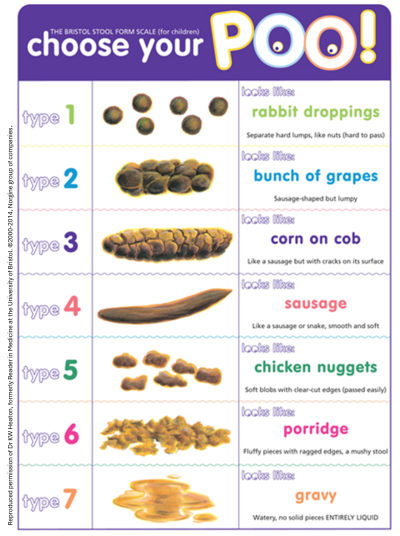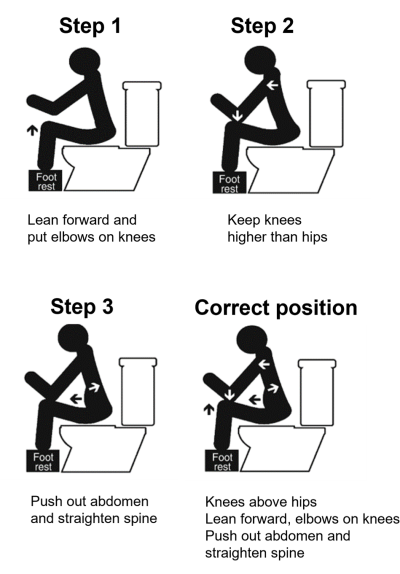Neurodiversity information for parents and young people
About constipation
Constipation is a common problem in childhood. Often there is no particular reason for it, but it can be upsetting for you and your child.
Children are constipated if they pass hard painful poo, if they have infrequent poo, or a combination of both. Medical professionals sometimes use the word ‘stool’ to describe poo.
Your child may be constipated if you notice one or more of the following:
- they have not done a poo at least 3 times in the last week
- their poo is large and hard (type 2 or 3 in the diagram)
- their poo looks like rabbit droppings or little pellets (type 1)
- they are straining and in pain when they poo
- they are bleeding during or after having a poo because their poo is large and hard
- they have a poor appetite or stomach pain which gets better after a poo
- if your child has runny poo (diarrhoea) leaking round hard constipated poo, which may soil their pants (overflow soiling).
How to assess your child's poo
This chart helps you assess your child’s shape and type of poo.

What causes constipation
Children become constipated for many reasons, but sometimes there is no obvious cause. It may be that your child has been ill with a fever and was drinking less. Or your child may not have been drinking enough fluids or having enough fibre from fruit and vegetables in their diet.
This table shows how much fluid male and female children need to drink.
| Male (mls milk) | Female (mls milk) | |
| Infant 0 to 6 months | 700 | 700 |
| Babies 7 to 12 months | 600 | 600 |
| Children 1 to 3 years | 900 | 900 |
| Children 4 to 8 years | 1200 | 1200 |
| Children 9 to 13 years | 1800 | 1600 |
| 14 to 18 years | 2600 | 1800 |
Sometimes children get constipated when they are stressed about potty or toilet training. Or something else may be worrying them, like school or nursery.
Children who are less physically active (because of their lifestyle or because they have a disability) are more likely to suffer with constipation.
Treatment
![]()
Make a GP appointment soon if you think your child may be constipated. Treatment works better if it’s started early. Laxatives are often recommended for children who are eating solid foods, together with advice about diet and exercise.
Laxatives (a type of medication that helps you poo) can help soften and regulate poo which makes it easier for your child to go to the toilet. There are lots of different laxatives but the most commonly used are Movicol or Laxido.
It may take several months for treatment to work. Laxatives may make your child’s overflow soiling worse before it gets better.
Once your child’s constipation is under control, your GP may advise your child to keep taking the treatment for a while longer, to make sure everything is back to normal.
What you can do to help your child
- Make sure they drink 6 to 8 glasses of water or squash per day.
- Encourage them to eat a high fibre diet. Foods with high fibre include fruit, vegetables, high-fibre bread, baked beans, and wholegrain breakfast cereals.
- Encourage them to be physically active.
- Try to get them into a regular toilet habit after meals or before bed, and praise them whether they poo or not. This is particularly important for potty-trained boys, who may forget about pooing once they are weeing standing up.
- Make sure your child can rest their feet flat on the floor or a step (footrest) when they’re using the potty or toilet. This ensures their knees are higher than their hips. Encourage them to also lean forward a bit. This helps get them in a good position for pooing.
- Use the image below to help your child sit on the toilet correctly.

- Stay calm and allow plenty of time so your child does not feel stressed or rushed.
If things do not improve
![]()
Contact your GP if you have followed the advice in this leaflet and your child is still constipated. Your GP may refer your child to a paediatric clinic for further help.
More information
NHS information on keeping kids active
Bladder and Bowel UK information on childhood constipation
Information from ERIC, the Children's Bowel and Bladder charity
Contact information
Paediatric Admin Team, Monday to Friday, 9 am to 5 pm